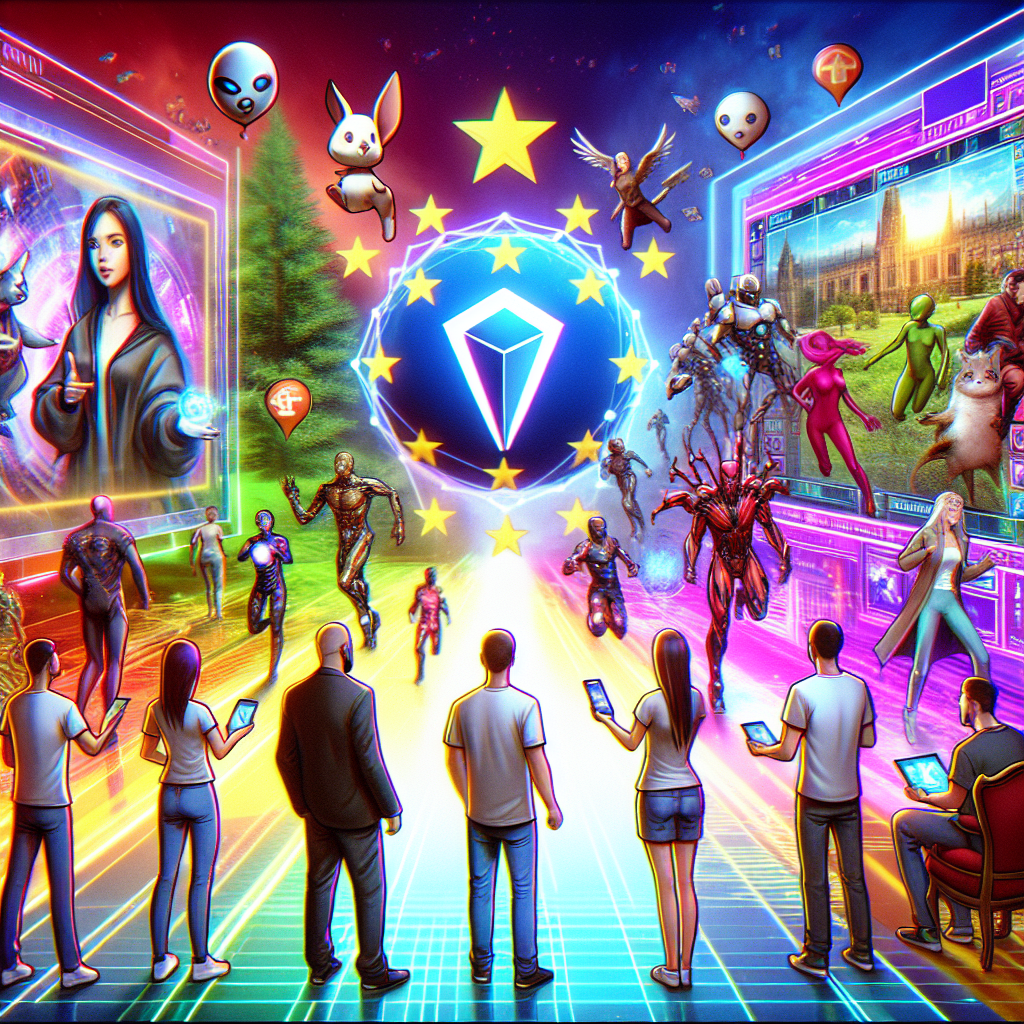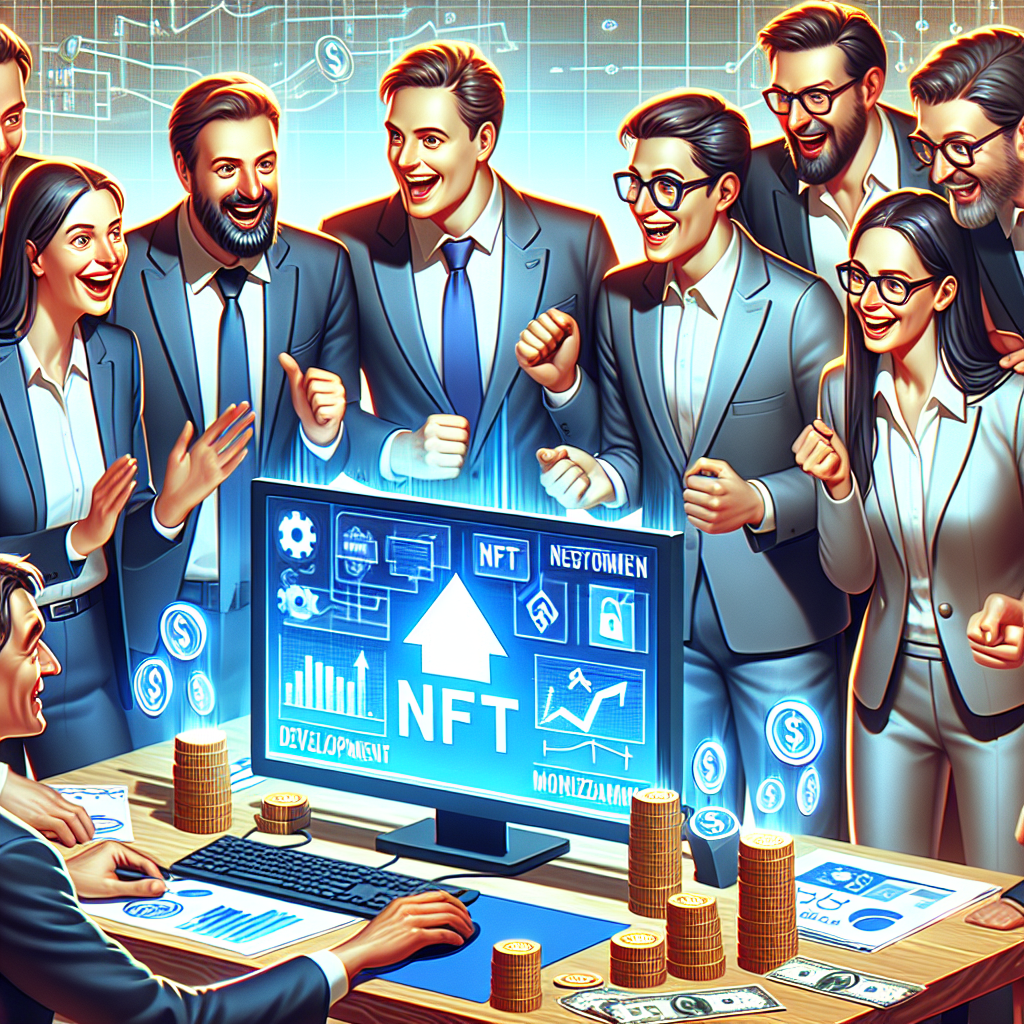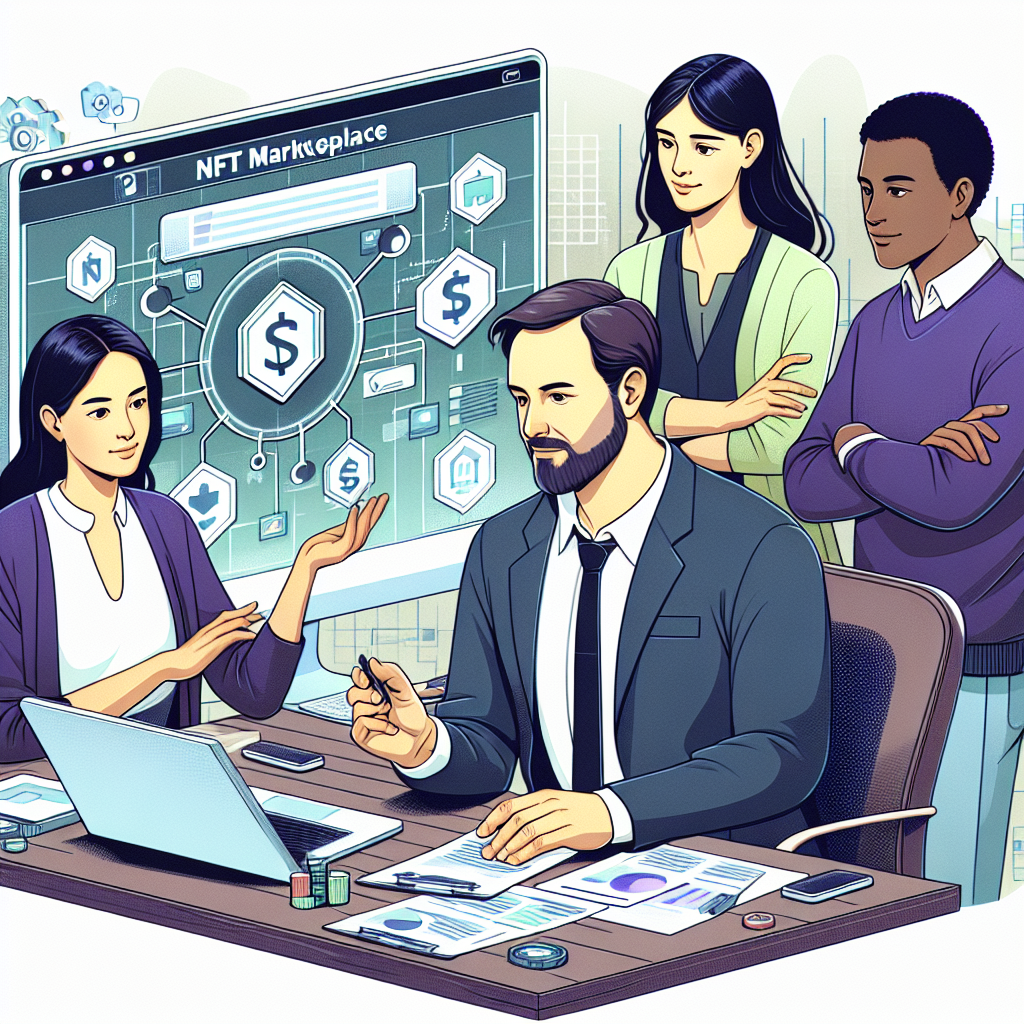Innovative Development of NFT Games and Platforms, Affordable Costs of NFT Marketplace Development
Transforming Gaming: The Development of an NFT Gaming Platform

Imagine a world where every game you play not only entertains you but also rewards you financially. Sounds intriguing, right? ⭐ That world is becoming a reality through the development of an NFT gaming platform. Lets explore how this innovative approach is set to revolutionize the gaming industry and change the way we interact with digital assets.
What Are NFTs and How Do They Fit?
Non-fungible tokens (NFTs) represent ownership of unique items, primarily in the digital realm. In gaming, this means that characters, skins, and other in-game assets can now be owned individually by players. For example, if you buy a rare sword in an NFT game, you possess that item, and its value can increase based on rarity and demand. According to a report, the NFT gaming market is projected to grow to $412 million by 2025, showcasing its booming relevance.
Key Benefits of Developing an NFT Gaming Platform
- ⭐ Ownership: Players have true ownership of in-game assets.
- ⭐ Monetization: Developers can introduce new revenue models, such as royalties on resales.
- ⭐ Global Reach: NFT games can connect players worldwide without traditional limitations.
- ⭐ Community Engagement: Players can create, trade, and participate in economies that enhance gameplay.
Why Should You Consider Developing NFT Games?
The development of NFT games isn’t just about jumping on the bandwagon; it’s about leading the charge in a new era of gaming. Companies like Axie Infinity have shown how NFT games can become massive, with more than 2.5 million daily active users in 2022! But what does this mean for you? If youre a developer, this is your opportunity to create something visionary that can capture the gaming communitys heart and wallet.
Real Stories: A Game Changer
Consider Sarah, a passionate gamer and developer. Sarah invested in creating an NFT game where players could trade virtual pets. Through her innovative platform, players gained real ownership of their pets, creating an economy around buying, selling, and breeding these digital companions. Her platform not only entertained thousands but also provided financial incentives, generating over €50,000 in revenue in its first year. This success exemplifies how the right development of an NFT gaming platform can lead to both fun and profit.
| Type of Game | Average Monthly Revenue (EUR) | Number of Players | Initial Costs (EUR) |
|---|---|---|---|
| Virtual Pets | €50,000 | 25,000 | 24,000 |
| Fantasy RPG | €80,000 | 40,000 | 30,000 |
| Strategy Games | €120,000 | 50,000 | 35,000 |
| Digital Collectibles | €30,000 | 15,000 | 20,000 |
| Card Games | €45,000 | 22,000 | 18,000 |
What About the Cost of Developing an NFT Marketplace?
Understanding the cost of developing an NFT marketplace is crucial for your projects success. Depending on the complexity and features you plan to implement, you can expect costs ranging from €18,000 for a basic platform to over €45,000 for a fully-featured system. Ensuring you get a tailored solution will provide you with a competitive edge in this growing ecosystem.
Need Help? Don’t Hesitate!
Our dedicated team at Zuniweb Studio has over 20 years of experience in software development, including expertise in blockchain and NFT technologies. Whether youre ready to dive into the development of an NFT gaming platform or have questions about adapting your existing games to include NFTs, we can help. Contact Alexandr, our customer relations manager, at Go Telegram Chat or visit zuniweb.com to start your journey today! ⭐
Frequently Asked Questions
- What are NFTs?
NFTs are unique digital assets that represent ownership of a specific item or content. - How much does it cost to develop an NFT game?
The costs can start from €18,000 and go up depending on complexity and features. - Are NFT games profitable?
Yes, many NFT games generate substantial revenue through transactions and player engagement. - How do I market my NFT game?
Utilize social media, partnerships, and community engagement to build visibility. - Can I create my own NFTs?
Yes, as a developer, you can create and sell your NFTs within your games. - Are NFTs environmentally friendly?
Many platforms are developing eco-friendly solutions to mitigate their environmental impact. - What platforms support NFT games?
Ethereum, Binance Smart Chain, and Polygon are popular options for developing NFT games. - What are the legal considerations for NFT games?
It’s essential to understand copyright and ownership laws when developing NFT content. - How do I ensure my NFT game is secure?
Utilize robust security protocols, smart contracts, and regular audits to safeguard your assets. - Where can I find NFT marketplaces?
Platforms like OpenSea, Rarible, and AtomicMarket are well-known for buying and selling NFTs.
Discovering Trends: What You Need to Know About the Development of NFT Games
contact us
Game apps can be really expensive to build and maintain, but don’t worry, we do everything in our mix to ensure that you get the best, for the best cost.

The world of gaming is evolving rapidly, and the development of NFT games is at the forefront of this transformation. If youre eager to understand the contours of this dynamic landscape, youre in the right place! Lets dive into the key trends and intriguing edge cases that define the future of NFT gaming. ⭐
Current Trends in NFT Game Development
Before embarking on an NFT game venture, it is critical to familiarize yourself with the trends shaping the market. Here are some noteworthy trends you shouldn’t ignore:
- ⭐ Play-to-Earn Models: The paradigm is shifting from pay-to-play to play-to-earn. Games like Axie Infinity allow players to earn real money through active participation and skill. This business model is gaining traction as players seek thrilling experiences that can also bring financial rewards.
- ⭐ Interoperability: A growing trend in the development of NFT games is enabling assets from one game to be used in another. Imagine using skins from your favorite game in another universe! This interoperability fosters greater player engagement and asset value.
- ⭐ Fractional Ownership: Fractional ownership allows multiple players to own a portion of high-value NFTs. This democratizes access to rare in-game assets and increases participation. This trend is already seen in games with prized assets, where players pool resources to buy and share them.
- ⭐ Augmented Reality (AR) and Virtual Reality (VR): The fusion of NFT games with AR and VR technologies is pushing the boundaries of reality. Imagine exploring a digital world with your friends, where each character is an NFT, uniquely yours!
- ⭐ Community-Driven Development: More games are being developed collaboratively with players contributing to the design. This community-centric approach ensures games genuinely reflect the desires of their audiences, fostering loyalty and engagement.
Edge Cases: Unique Use Cases in NFT Gaming
While trends are essential, exploring edge cases provides deeper insights. Here are a few unique scenarios that illustrate the versatility of NFT gaming:
- ⭐ Digital Art Battles: Some NFT games allow users to create and use digital art pieces as characters or skins. Players can engage in battles, elevating artists visibility while merging both worlds seamlessly.
- ⭐ Charity Competitions: Several NFT games are developing features where players can participate in competitions with entry fees going directly to charities. This creates a new way for gamers to contribute to social causes while enjoying their favorite pastime.
- ⭐ Environmental Initiatives: Games that promote eco-friendliness, like planting a tree for every NFT sold, are making waves. Players passionate about sustainability are drawn to these initiatives, integrating meaningful actions into gameplay.
- ⭐ Real-World Collaborations: Partnerships with brands are now more common. For example, a game might collaborate with a major fashion brand to create exclusive in-game outfits as NFTs. This not only enhances user experience but also brings the two worlds together.
- ⭐ Customizable Game Worlds: Some games allow players to design and furnish their worlds using NFTs. Players can create unique experiences that reflect their personality, blurring the lines between creator and consumer.
Understanding the Process of NFT Game Development
The development of NFT games is a multi-faceted journey. Here’s a simple outline of the steps involved:
- ⭐ Conceptualization: Start with a unique idea. Identify the target audience and establish the gameplay mechanics.
- ⭐️ Design: Focusing on graphics, characters, and environments is essential for an engaging experience.
- ⭐ Blockchain Integration: Choose a blockchain platform that aligns with your vision, such as Ethereum or Binance Smart Chain.
- ⭐ Development: This involves coding the game and integrating smart contracts for the NFTs.
- ⭐ Testing: Rigorously test the game for bugs and issues to ensure a seamless user experience.
- ⭐ Marketing: Launching with a solid marketing plan maximizes reach and engagement.
Why Partner with Us?
At Zuniweb Studio, we bring over 20 years of expertise in software development to your NFT game project. From concept to launch, our professional specialists handle every aspect, providing you with all services in one place. Experience the development of NFT games like never before! ⭐ Want to learn more? Contact Alexandr at Go Telegram Chat or explore our offerings at zuniweb.com.
Common Questions About NFT Games Development
- What are NFTs in gaming?
NFTs are digital assets representing ownership of unique in-game items. - How do play-to-earn models work?
Players can earn real money through in-game activities and achievements. - Can NFTs be used in multiple games?
Yes, interoperability allows NFTs to be used across different platforms. - What are some successful NFT games?
Examples include Axie Infinity, Decentraland, and The Sandbox. - What blockchain is best for NFT games?
Ethereum is popular, but others like Binance Smart Chain and Flow are also viable. - Are NFT games environmentally friendly?
Some games implement eco-friendly practices, but energy consumption varies by blockchain. - How can I get started in NFT game development?
Begin with a unique concept, engage developers, and embark on your project! - Do I need coding skills for NFT game development?
While beneficial, many platforms now offer tools that simplify the process. - Whats the average cost to develop an NFT game?
Costs can range from €18,000 to over €45,000, depending on complexity. - What trends should I follow in NFT gaming?
Stay updated on play-to-earn models, interoperability, and community engagement.
Why Understanding the Cost of Developing an NFT Marketplace is Essential for Your Next Project
contact us
Game apps can be really expensive to build and maintain, but don’t worry, we do everything in our mix to ensure that you get the best, for the best cost.

Entering the world of NFT marketplaces can be an exhilarating adventure, but it also comes with its own set of challenges and financial considerations. If you’re looking to dive into this lucrative sector, understanding the costs involved in the development of an NFT marketplace is absolutely crucial. ⭐ Lets break it down!
The Market Demand for NFT Marketplaces
With NFTs taking the digital world by storm, the demand for well-designed, user-friendly NFT marketplaces is on the rise. Countless creators, artists, and gamers are looking for platforms to buy, sell, and trade their digital assets. According to recent statistics, the NFT market has already surpassed €10 billion in total sales, highlighting its growing importance. By understanding the costs, you can position yourself strategically in this booming industry.
Understanding the Cost Breakdown
When planning the development of an NFT marketplace, there are several cost categories you should thoroughly analyze:
- ⭐ Development Costs: This is usually the most significant portion of your budget. The costs can range from €18,000 for a basic platform to over €45,000 for a feature-rich experience. Factors influencing these costs include the complexity of the platform, technology stack, and the level of customization required.
- ⭐ Security Measures: Given the high-stakes nature of NFTs, investing in robust security protocols is a must. This could involve spending an additional 10-20% of your development budget on smart contract audits and security measures.
- ⭐️ Blockchain Fees: Depending on the blockchain you choose (like Ethereum), you might incur transaction fees, also known as "gas fees." Understanding these can help you budget more accurately for ongoing operational costs.
- ⭐ Marketing and User Acquisition: Once your marketplace is ready, you’ll need a solid marketing plan to attract users. Budgeting around 15-20% of your total investment for marketing and promotions is advisable to gain traction quickly.
- ⭐ Maintenance and Support: Post-launch, you will incur ongoing costs for updates, patches, and added features. A maintenance budget of around 10-15% of your initial development costs should be anticipated to keep everything running smoothly.
Real-World Example: Calculating Your Potential Investment
Let’s cover an example scenario to clarify potential costs:
| Cost Item | Estimated Cost (EUR) |
|---|---|
| Basic Marketplace Development | €18,000 |
| Security Audits | €3,000 |
| Blockchain Fees (Initial) | €2,000 |
| Marketing Budget | €5,000 |
| Annual Maintenance | €2,000 |
| Total Estimated Investment | €30,000 |
Why a Comprehensive Cost Understanding is Key
Failure to grasp the cost of developing an NFT marketplace can lead to several pitfalls:
- ⭐ Budget Overruns: Building without a clear financial plan can lead to unexpected expenses that may jeopardize the project.
- ❌ Poor Resource Allocation: Misunderstanding costs can inhibit your ability to allocate enough resources to critical areas like security and marketing.
- ⭐ Missed Opportunities: A lack of financial insight can limit your capacity to take advantage of market trends, leading to lost profitability.
- ⭐ Difficulty in Partnerships: Investors and partners will want to see a comprehensive understanding of costs before engaging with you.
How We Can Help!
At Zuniweb Studio, we understand the intricacies of NFT marketplace development inside and out. With over 20 years of experience, our professional team can guide you through the entire process, from budget estimation to launch. If you’re ready to explore the development of an NFT marketplace, don’t hesitate to reach out! ⭐ Contact Alexandr at Go Telegram Chat or visit zuniweb.com to discover how we can support you in your next project!
Frequently Asked Questions
- What are NFTs?
NFTs are unique digital assets verified on a blockchain, giving ownership to specific items. - How much does it cost to develop an NFT marketplace?
Costs can range from €18,000 to over €45,000 depending on features and complexity. - What ongoing costs should I expect?
Maintenance, security audits, marketing, and blockchain fees are essential ongoing expenses. - How can I market my NFT marketplace?
Utilize social media, influencer partnerships, and community-driven engagement strategies. - What blockchain platform is best for NFTs?
Ethereum is popular, but others like Binance Smart Chain and Flow are also viable. - Are NFT marketplaces secure?
Security is paramount; investing in audits and security measures is non-negotiable. - Can I sell my NFTs on multiple marketplaces?
Yes, many NFTs can be listed on multiple platforms simultaneously. - Are there any legal considerations?
Yes, understanding copyright and ownership laws is essential when dealing with NFTs. - How long does it take to develop an NFT marketplace?
Depending on complexity, it can take anywhere from 3 to 6 months. - Is there a way to reduce development costs?
Utilizing open-source tools and collaborative tactics can help lower costs.
Debunking Myths: Is the Development of an NFT Gaming Platform Really Worth the Investment?
contact us
Game apps can be really expensive to build and maintain, but don’t worry, we do everything in our mix to ensure that you get the best, for the best cost.

The realm of NFT gaming is full of excitement, innovation, and yes—myths! If youre considering the development of an NFT gaming platform, you might have encountered doubts and misconceptions along the way. ⚡ Let’s set the record straight and evaluate whether investing in this evolving technology truly pays off.
Myth 1: NFTs Are Just a Fad
One common myth is that NFTs are a passing trend. While trends come and go, data shows that the NFT market is not going anywhere. A report indicates that NFT sales rose to €10.7 billion in Q3 2021 alone, with significant year-on-year growth. This growth is a clear indication that NFTs are paving the way for innovative business models in gaming, making it a viable investment. ⭐
Myth 2: Developing an NFT Game is Easy and Cheap
Another misconception is that launching an NFT game is straightforward. In reality, creating a robust NFT gaming platform requires a combination of technical expertise, creativity, and investment. The cost of developing an NFT gaming platform spans from as low as €18,000 for a basic version to over €45,000 for one with advanced features and security measures. This investment is critical to provide a seamless user experience and ensure the security of transactions. ⭐
Myth 3: Only Big Companies Can Succeed
Many believe that only established gaming companies can capitalize on NFTs. However, smaller developers have successfully disrupted the market by offering unique concepts and engaging gameplay. Take the example of Axie Infinity, which gained enormous popularity from a small team. As long as your game provides value, creativity, and a strong community, you can thrive in this space. ⭐
Myth 4: NFTs Are All About Making Money
While earning potential is undeniable, many consumers engage with NFTs for reasons beyond just profit. Players enjoy owning unique digital assets, customizing their experiences, and participating in vibrant online communities. Emotional connections to in-game assets can lead to greater loyalty and engagement, offering a more robust business opportunity than one focused purely on monetary transactions. ⭐
Myth 5: Security Concerns Are Overblown
Security is a critical issue in the NFT marketplace, but the perception that it is overly dangerous can deter potential developers. While high-profile hacks have occurred, investing in proper security measures and auditing smart contracts significantly mitigates risks. Establishing a secure platform builds trust, leading to user loyalty and long-term gains. ⭐
Why the Investment is Worth It
Given the myths dispelled, let’s explore the compelling reasons to consider investing in the development of an NFT gaming platform:
- ⭐ Expanding Market: The interest in NFTs, particularly in gaming and collectibles, is rapidly expanding, presenting a goldmine of opportunities for early adopters.
- ⭐ Innovative Revenue Streams: Beyond traditional sales, NFT games can utilize royalties, in-game transactions, and community-driven initiatives to monetize effectively.
- ⭐ Global Reach: Players from around the world can connect and engage, breaking down geographic barriers and opening new markets.
- ⭐ Player Ownership: Providing true ownership of assets leads to higher player engagement and loyalty, enhancing the longevity of platforms.
- ⭐ Community Building: Engaging with the community fosters a dedicated player base that actively participates in the growth and development of the game.
Conclusion: Time to Take the Leap!
In summation, debunking these myths reveals a rich landscape where the development of an NFT gaming platform is not only feasible but also profoundly rewarding. If you’re ready to embark on this journey but need expert guidance, look no further! Our team at Zuniweb Studio has over 20 years of experience in the software development realm, and we’re here to help you succeed. ⭐ Contact Alexandr at Go Telegram Chat or visit zuniweb.com to step into the future of gaming!
Frequently Asked Questions
- Are NFTs just a passing trend?
NFTs are gaining popularity with continued sales growth, indicating that they are here to stay. - What is the average cost to develop an NFT game?
Costs can start around €18,000 and go up depending on features and complexity. - Who can succeed in NFT gaming?
Small developers with unique ideas can also thrive, not just big companies. - Are NFTs only about making money?
NFTs offer players value through ownership and engagement in communities, not just profit. - How serious are security concerns in NFT gaming?
Security is vital, but proper measures can mitigate risks significantly. - What new opportunities do NFTs present?
NFTs enable innovative revenue streams and foster community engagement. - How does player ownership affect engagement?
Players feel more invested in games where they own unique assets, leading to greater loyalty. - What are potential market challenges?
Staying ahead in innovation and addressing regulatory issues can be challenging but manageable. - What technical skills do I need for NFT game development?
Technical knowledge in blockchain technology, smart contracts, and game development is essential. - How can I get started with my NFT game project?
Begin by outlining your concept and reaching out for expert guidance to navigate your development.

Currently under development

Heroes Infinity: RPG + Strategy + Super Heroes
An epic action RPG packed with heroes, battles, and boundless adventure. Dive into the captivating world of Heroes of Infinity and embark on an unforgettable journey through cities and distant lands. Recruit powerful heroes, battle relentless enemies, and build your ultimate legendary team.
Experience seamless gameplay and captivating challenges. We blend smooth mechanics with dynamic pacing to ensure your adventure never slows down. Dive into an immersive world where every move matters — with rich visuals, responsive controls, and battles that push your strategy and skills.
RPG
mobile
strategy
Unity 3D